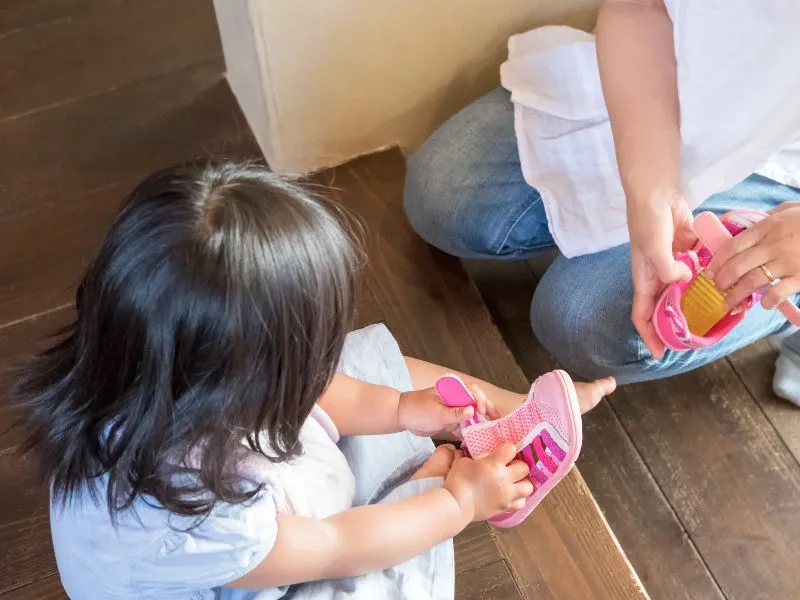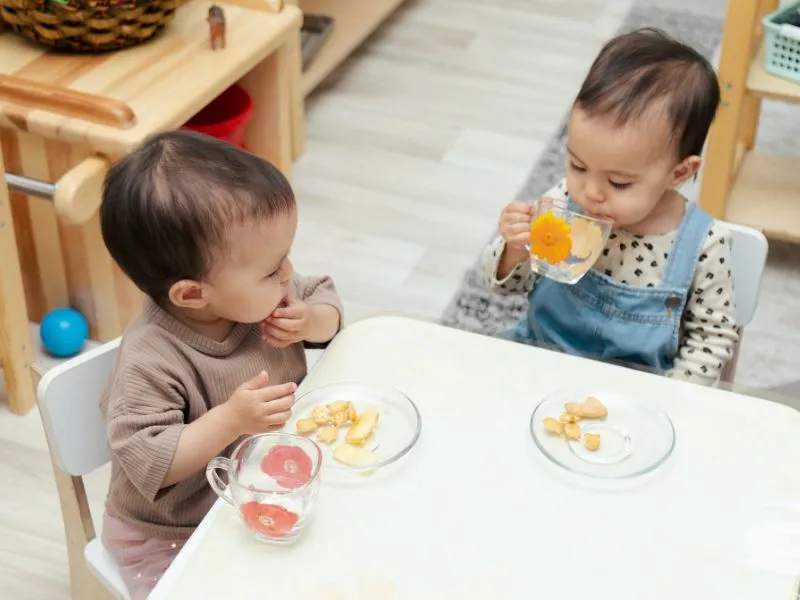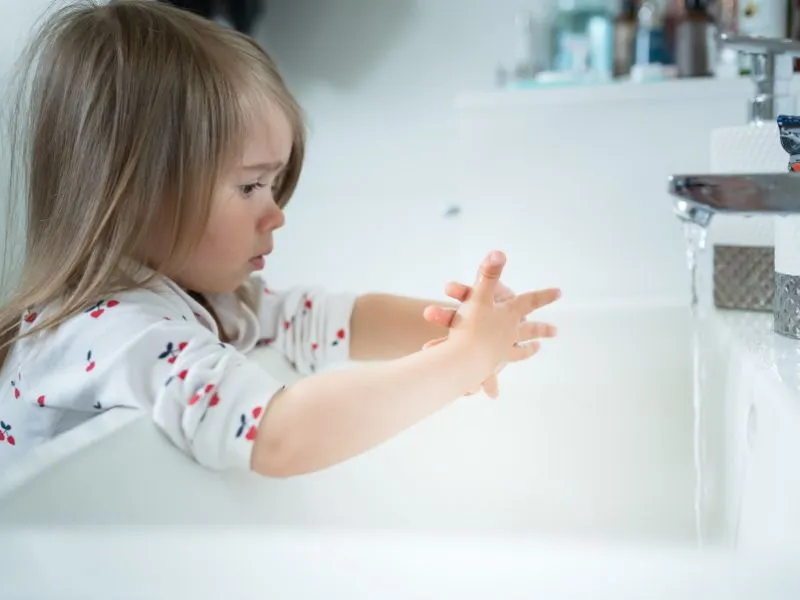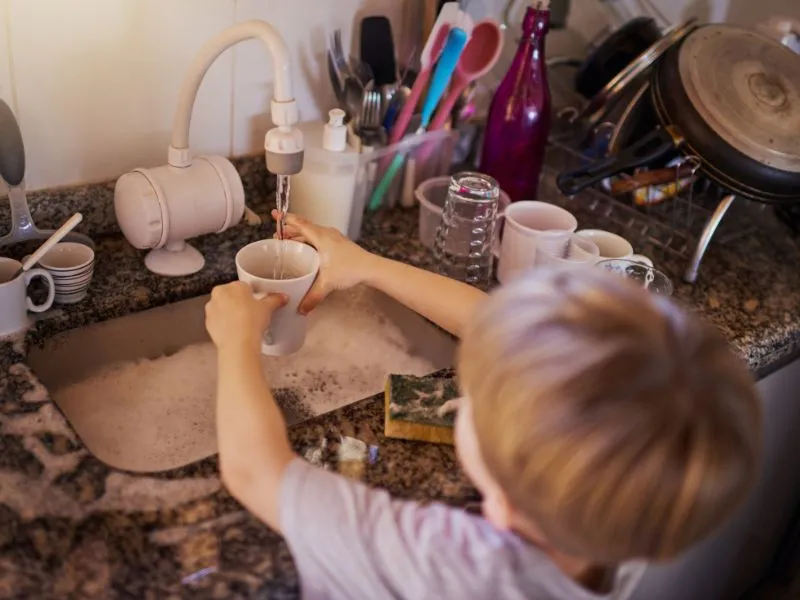SELF HELP SKILLS FOR TODDLERS
As soon as your little one steps into toddlerhood, they will start showing signs of wanting to do things more independently. We, as parents can help them in many ways to master those little skills that help them do things for themselves without needing help.
It is an exciting time for parents to see their bubs trying to practise self help skills in everyday life during playtime, mealtime, bath time or any time of the day.
Needless to say that encouraging self help skills for toddlers is going to benefit your bub in so many ways. First, let’s see how we can promote self help skills.
Self Help Skills for Dressing and Grooming
Putting on and taking off clothes independently
As they develop fine motor skills, they will try putting on clothes and taking them off.
Start with pants and shorts which are easier and then move on to tops. Give plenty of encouragement and expect many mistakes on their part. But they will get there eventually!

Buttoning, zipping, and tying shoelaces
Buttoning, zipping and tying shoelaces require some really good agility and control of the fingers. Keeping that in mind, let’s introduce them to the kids one by one.
Start with bigger buttons with bigger button holes (if you can make it at home), bigger zippers and tying knots with thick shoelaces.
Start small and go from there.
Brushing teeth and hair
They will learn to brush their teeth and hair by watching you.
Make sure you teach them the correct way of brushing teeth (how to hold the toothbrush, movements, time).
Let them practise brushing on their own but don’t forget to check if they have done it properly. A toddler’s hand is usually not mature enough to brush the upper or lower jaw properly.
Washing hands and face
You just can’t stress enough how important washing your hands is. Before eating, after going to the toilet, after playing and so on encourage children to wash their hands with soap.
Washing the face is just as important although it is encouraged only in the morning and at night. Let your kids have a turn washing their faces and you can check that it’s done properly.
Self Help Skills for Eating and Drinking

Self help skills for eating and drinking can be one of their very first interests in toddlerhood. Who doesn’t get fascinated by food and drinks?
Using utensils properly
Have meals as a family so that they get to see how you use cutlery. As they show interest, you can introduce kids to cutlery with mushed or chopped food which is easier to handle with cutlery.
Get ready for a mess, but it’s so satisfying to see how they control their little hands to grab, scoop, mix and bring the spoon to their mouth indicating growing hand-eye coordination.
Drinking from a cup or straw
During toddlerhood, children can say bye-bye to their bottle teats and start exploring small cups and straws.
Drinking from a cup requires a lot of control from their hands and after a few spills or wet cloths, they will learn the trick of how to drink from a cup.
Until they master it, you can use a straw bottle as it’s much easier for toddlers to have a spill-free drink from these.
Opening containers and packaging
This is the time when they crawl or walk around exploring the surroundings. They will see toy boxes, different packages and cans. While ensuring the safety of your kids, let them have boxes, jars, bottles with lids that they can open and close.
This will give them practise with their little hands.
Wiping their own mouth and cleaning up after meals
Cleaning up after meals is an essential part to be completed after meal time. And let your kids understand that. Removing the plates and cups, wiping the table are going to make your life a whole lot easier.
Not to mention, how confident they will feel.
Self Help Skills for Bathroom Routines

Using the toilet independently
It’s another important skill that children may learn at 18 months. It may take more time for some children but not to worry. Everyone is different and toilet training requires a lot of patience on your part.
Read books about how to use a potty, listen to such songs and initially encourage them to practise sitting on a potty. Maybe you can do a small demonstration of how it all happens.
Encouraging words and rewards can go a long way here.
Washing hands after using the toilet
Toilet training is not complete without them learning to flush the toilet, wash their hands and use tissues to clean their bottom. It will take time for your kid to learn all these but learning the sequence is more important during toddlerhood.
Learning to manage personal hygiene independently
Personal hygiene includes washing hands, having a bath, brushing teeth and so on. When children can do all these things independently, it’s a big relief to you because you know they will manage personal hygiene even when you are not around.

Developing Self Help Skills for Toddlers
Creating a supportive and nurturing environment
It takes a lot of encouragement, support and patience on your part for your toddler to feel confident enough to practise self help skills.
There are little things you can do to create a supportive environment for them to be independent.
- Place toys in lower drawers for easy access.
- Toddler cutlery for an easy grip.
- Toothpaste/soap dispensers for easy access.
- Baby-proof the house.
Breaking tasks down into manageable steps
Some tasks may appear intimidating to children. So you can break it down to few smaller steps helping them to remember the sequence.
Ex: When brushing their teeth, start with the front row, then go to upper and lower jaws. Finally tongue. Wash their mouth. It takes quite a few steps to help children learn the correct order and the correct way
Providing appropriate tools and equipment
Appropriate tools and equipment which are age-appropriate so that children don’t get frustrated or discouraged trying to work with adult equipment and tools.
Ex: High chair, Toddler cutlery
Offering praise and rewards for effort and progress
The fact that they are trying itself is a win, so don’t forget to offer plenty of praise and rewards for their progress.
Encouraging practice and persistence
The truth is our kids are not going to master these skills overnight. But they will learn a lot from trial and error.
Encourage them to practise more and more.
Benefits of Developing Self Help Skills

Promoting independence and self-confidence
When your toddler learns to do things independently without relying on your help all the time, that builds a sense of independence and self-confidence in them.
Read more on independent play
Developing fine and gross motor skills
Using cutlery, a toothbrush, combing hair or buttoning a shirt develops children’s fine motor skills strengthening the muscles in their hands.
Climbing stairs, going down stairs, carrying their own things, walking themselves to places (without being carried) develop their gross motor skills.
Fostering a sense of accomplishment and pride
When they can do things for themselves and take care of their needs without asking for help, it fosters a sense of accomplishment and pride in them.
Preparing toddlers for future challenges and responsibilities
As they grow up, there will be so many exciting personal and social events in life that may require children to be more independent.
Starting Kindergarten is one of them.
Family holidays, sleepovers, excursions are some of the places where children get to meet their peers and spend time together.
Whatever future challenges may be, a child who is beginning to be independent will face them more successfully.
Addressing Challenges and Common Concerns
Dealing with resistance and tantrums
As you encourage your little one to try to do things independently, there can be a lot of frustration, resistance and tantrums.
As the food falls off the spoon, water spills on their shirt or they put the shirt inside out, they might express their big emotions.
Be calm, kind and explain to them why it’s important to try it on their own.
Make sure your child is mature enough to do those tasks and offer help when necessary.
Related post about toddler tantrums
Patience and understanding during the learning process
Needless to say, they are going to make a lot of mistakes. They may take forever to get ready or finish their meal and sometimes you will be at your wit’s end.
But Patience is the key in this learning process.
Relax! they will get there eventually. All they need is a bit of practice.
Seeking professional help if needed
Finally, if your child shows no interest in doing basic self care activities or struggles with fine motor skills and gross motor skills expected for their age, it’s best to seek some professional help.
Conclusion
It is important for us to encourage self care skills for toddlers. They will prepare our little ones for challenges and responsibilities in the future and will be a huge confidence boost for them.
Hope these tips will help your toddler try something new every day. Share your thoughts with us !

Leave a Reply